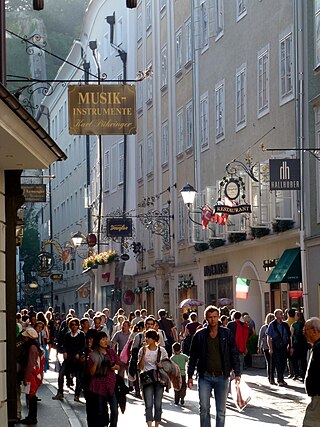
Salzburg is a province (Land) of Austria. It is officially named Land Salzburg to distinguish it from its eponymous capital — the city of Salzburg. For centuries, it was an independent Prince-Bishopric of the Holy Roman Empire.

Saint-Guilhem-le-Désert is a commune in the Hérault department in the Occitanie region in southern France. Situated where the Gellone river's narrow valley meets the steep-sided gorge of the river Hérault, Saint-Guilhem-le-Désert is essentially a medieval village located on the Chemin de St-Jacques pilgrim route to Santiago de Compostella.

Nonnberg Abbey is a Benedictine monastery in Salzburg, Austria. Founded c. 712/715 by Saint Rupert of Salzburg, it is the oldest continuously existing nunnery in the German-speaking world. The monastery complex is today a protected monument and part of the Historic Centre of the City of Salzburg, a UNESCO World Heritage Site since 1996.

St Peter's Abbey, or St Peter's Archabbey, is a Benedictine monastery and former cathedral in the Austrian city of Salzburg. It is considered one of the oldest monasteries in the German-speaking area, and in fact the oldest with a continuous history since its foundation in 696.

Getreidegasse is a busy shopping street in the historic Altstadt of Salzburg, Austria, a UNESCO World Heritage Site since 1996. It is known for the birthplace of Wolfgang Amadeus Mozart at No. 9, where he lived until the age of 17. The narrow street is characterised by numerous high townhouses side by side with its wrought iron guild signs.

Mirabell Palace is a historic building in the city of Salzburg, Austria. The palace with its gardens is a listed cultural heritage monument and part of the Historic Centre of the City of Salzburg UNESCO World Heritage Site.

The Mönchsberg, at 508 meters (1,667 ft) above sea level, is one of five mountains in the city of Salzburg in Austria. It flanks the western side of Salzburg's historic city centre, and forms part of the city's UNESCO World Heritage Site.

Residenzplatz is a large, stately square in the historic centre (Altstadt) of Salzburg in Austria. Originally named Hauptplatz, it is now named after the Alte Residenz of the Prince-Archbishops of Salzburg. It is one of the city's most popular places to visit.

The Historic Center of the City of Salzburg, also known as the Altstadt, is a district of Salzburg, Austria, recognized as UNESCO World Heritage Site since 1996. It corresponds with the historic city center, situated on the left and right banks of the Salzach river.

The Sigmundstor, often still known as the Neutor, is a road tunnel in Salzburg that also forms one of the city gates of the historic Altstadt. It connects the Altstadt with the Riedenburg quarter through the Mönchsberg mountain. Built in the 18th century, it is the oldest road tunnel in Austria.













